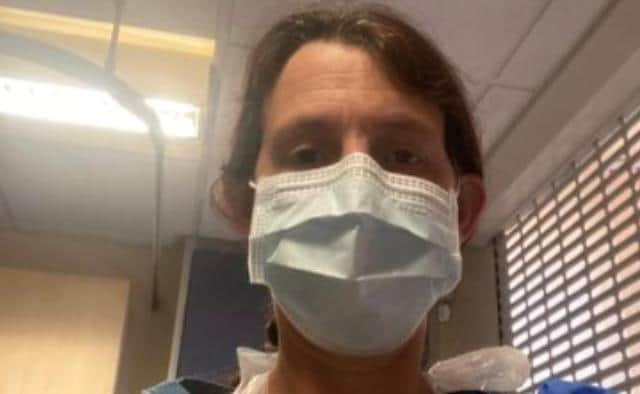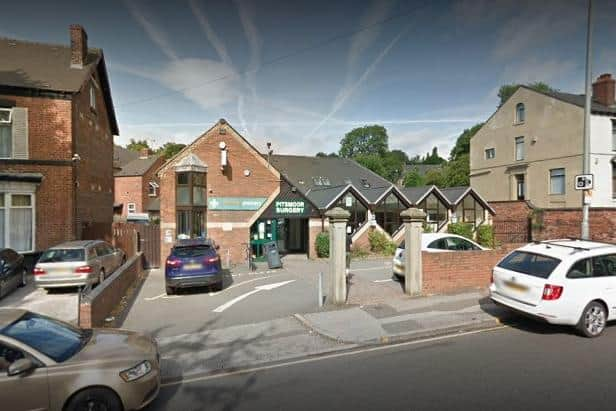Sheffield GP calls for more Government funding for NHS before it's too late
and live on Freeview channel 276
Dr Alison Hobbs, who works at Pitsmoor Surgery, echoed points made by Birley GP Ben Allen earlier this year and focused on funding and resource shortages, increasing workloads and a backlog of patients that has built up over the pandemic in her explanations for the way GP services currently are.
What did Dr Alison Hobbs say?


Dr Hobbs said: “I think a lot of the criticism is justified. We are angry on behalf of our patients. People don’t see how frustrating it is for us to know that we are not providing the services we want to and we are having to make further cuts.
Advertisement
Hide AdAdvertisement
Hide Ad“People are getting a rough deal, but most of us are not trying to shirk responsibility or have an easy life and use Covid as an excuse. At the moment I am working the hardest I have worked in my 20 year career, and it’s still not enough.
“The system is broken.”
Dr Hobbs, who published a video online in which she called the criticism GPs face while trying to deal with cuts as ‘soul destroying’, said: “There’s not enough central Government funding going into the NHS.


“If the public wants a free-at-the-point-of-delivery health service they can access whenever they like, the Government needs to provide the funding for that. At the moment, it is not and there are just not the resources.
“We don’t want to have to make cuts but we cannot cope with the funding we have. I want to get that message across.”
What are Sheffield GPs calling for?
Advertisement
Hide AdAdvertisement
Hide AdDr Hobbs said that she agreed with the statements made by Dr Ben Allen earlier this year when he explained to The Star that the key issue GPs face is an ever-increasing workload coupled with the lack of funding.
Speaking earlier this year, Dr Allen said: “GPs are given around £150 per year for each patient, and every year the workload increases but any small increase to funding does not nearly keep pace.
“The workload is increasing and so that needs funding to make it doable. At the moment it is not doable. In hospitals, if you do more operations you get more funding.
“But we still have the same contract for around £150 per person but the amount of work we need to do to fulfil that contract gets more challenging every year.”
Advertisement
Hide AdAdvertisement
Hide AdDr Hobbs gave an example of the sort of impact the lack of funding is having on GP practices in Sheffield.
She said: “My practice uses the same online system as Birley. Up until November 2020 it was 24/7 and we would respond to anything submitted to us on there on the next working day. Since November we have been told to cut back and then back again.
“We had to do this because so many cases were coming in and we could not cope and it was not safe for people to contact us with something urgent and expecting to be contacted in the next working day and us not being able to.
“We started by cutting it on weekends, then it went to only being open on weekdays until 3pm, and now it is only open between 6am and 9.30am.
Advertisement
Hide AdAdvertisement
Hide Ad“So in less than a year we have had to cut that service from 24/7 to 3.5 hours, five days a week.
“I am so against this. It is not my decision. But we are part of a practice and the overall majority were in favour of it.”
What is causing issues for GPs?
It has been widely reported that GP surgeries face an ever-increasing demand, which has been caused by a wide range of factors.
People are living longer and with a greater level of medical complexity than ever before; a backlog has arisen over the course of lockdown when people were unable to get to a surgery or were fearful of going; and there has been sharp rise in demand for GP services now that lockdown has eased.
Advertisement
Hide AdAdvertisement
Hide AdThroughout the pandemic GPs have been responsible for caring for patients awaiting delayed operations. All this, along with the expectation on GPs to carry out the vaccine rollout, has meant that doctors’ surgeries are under severe pressure.
Dr Hobbs spoke about how some people are disappointed when they get told to speak to another medical professional rather than their GP.
Due to the huge increase in demand, a triaging system is in place at most surgeries.
This means that when a patient rings up they are directed to the most suitable professional – which may not always be a GP, and some people are less comfortable with this.
Advertisement
Hide AdAdvertisement
Hide Ad“There is a misunderstanding by everybody about what can be provided by different professionals,” Dr Hobbs said.
“GPs have so much to do, and on top of seeing people we spend so much time doing administrative tasks like writing doctors’ letters that many people have been asking for during Covid.
“So, for example, if somebody rings up with a knee problem they might be told a physio will ring back and they are disappointed as they want their GP. But a physio would be more help with that problem than me.”
Why can patients not get GP appointments?
Dr Hobbs also addressed the frustration many patients feel about not being able to get face-to-face appointments as easily as they sued to be able to.
Advertisement
Hide AdAdvertisement
Hide AdAgain, she explained this was linked to the huge demand, but she also highlighted some other factors.
She said: “An issue that people often are not aware of is the fact that doctors’ surgeries are often quite small and cramped. Having lots of potentially ill people in together is a bad idea at the moment. So we try to have people coming in bit by bit rather than all squeezing in at once.
“If a person needs to be seen, then we will see them that day if we can. But we need to schedule patients so they are not all waiting at once.
“Also, another thing people are often not aware of is that at medical school you are taught that 90 per cent of the diagnosis comes from the patient history. My job is, for the most part talking to people.
Advertisement
Hide AdAdvertisement
Hide Ad“There are things that need to be done in person. Examinations, for example. But if it is something that can be done by talking, such as a follow up appointment, it can be done just as well over the phone or online.
“In this country there is a culture which is based around the idea of ‘I should get what I want’ and the NHS is set up in a way to only give people what they need.
“National media is driving this rhetoric that we should all get what we want whenever we want it, but no healthcare system in the world is funded to provide what people want.
“They are there to provide what people need. Unfortunately with the current Government funding the NHS can’t even do that.”
Advertisement
Hide AdAdvertisement
Hide AdWhen asked what the solution was, Dr Hobbs looked towards central Government, and said it needed to address its ‘priorities’.
“There needs to be a discussion at Government level as to what they think the NHS is there for and what can be provided,” she said. “There needs to be a discussion about what we expect of it.
“And internally the funding needs to be sorted out. 90 per cent of patient contact with NHS happens within primary care but it only gets eight per cent of funding.
“The Government has spent three times the amount on track on trace as it has on primary care in the same time period. It is about priorities.
Advertisement
Hide AdAdvertisement
Hide Ad“The way it is going the NHS is going to crumble and fall down. And then we are looking at a private system.
“Where I work in Pitsmoor, for example, that would be extremely detrimental. Private health care is not an option for some people.”
Comment Guidelines
National World encourages reader discussion on our stories. User feedback, insights and back-and-forth exchanges add a rich layer of context to reporting. Please review our Community Guidelines before commenting.
